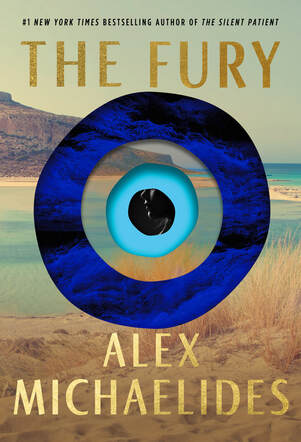 Many thanks to Celadon Books for the ARC of Alex Michaelides's The Fury, which will be out on January 16. The book begins with a murder on an isolated island in Greece, a story told by a screenwriter named Elliot Chase, and a group of people bound by the most tenuous of threads—their allegiance to ex-movie star Lana Farrar. Chase peels back his story in layers, gradually revealing its origins in an unplanned meeting with Lana at a party, delving into her childhood and the ways it reflected his own, and circling around the answers to the questions about the murder: who is the victim? who is the murderer? This was a fast read for me, and while it didn't bring about the same shock I felt during the twists and turns of The Silent Patient, it was still a compelling enough read.
0 Comments
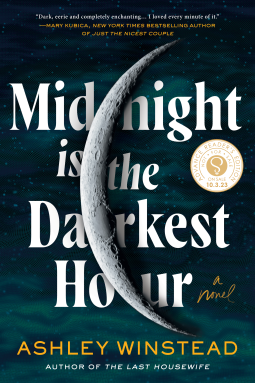 Thanks to NetGalley and Sourcebooks Landmark for the digital ARC of Ashley Winstead's Midnight Is the Darkest Hour. The book will be published on October 3! For years, since her friendship with Everett began, Ruth has waited for their sin to catch up with her. Drawn together by their crime, Ruth—confined by her father’s role as her small Louisiana town’s judge and confessor—and Everett—an outcast whose fate was cemented by his father’s evil—find refuge, affection, and understanding in each other, which brings them comfort as they ride out the end of their teenage years together. And then a skull is found in the swamp. Suddenly, the peril of discovery that has been looming over her life arrives at her doorstep. Everett now only visits Bottom Springs in the summer, so Ruth has sought refuge and her parents’ approval by stepping tentatively into their vision for her: no college; marriage to a hometown boy; a family; and a fundamentalist Christian lifestyle. But when Everett returns, Ruth feels pulled again to a different way of living. As the investigation speeds up, Winstead reveals the truths of Ruth’s past and present in alternating passages, revealing some secrets she’s kept and some that have been kept from her. Midnight Is the Darkest Hour was my first book by Winstead, and wow, was it compelling. I didn’t want to stop reading! The non-chronological structure of the novel creates twists and turns, solving one mystery only to uncover another. The role of books and reading in Ruth and Everett’s characters, and in their relationship, made my heart happy. Most of all, I loved watching Ruth work through her vision of who she wanted to be in the face of her parents’—and the town’s—oppressive expectations. What a satisfying read! 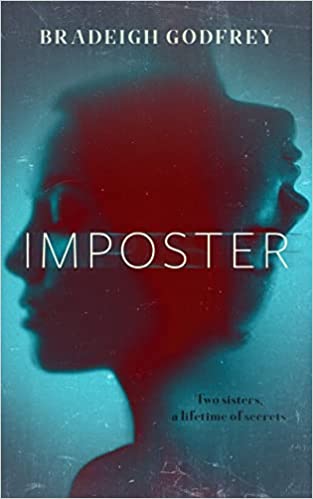 Thanks to Bradeigh Godfrey, NetGalley, and Blackstone Publishing for the egalley of Bradeigh Godfrey's Imposter, which will be out on Tuesday! Bradeigh Godfrey is going on my list of must-read authors! First, it was her collaboration on The Beach Trap that grabbed my heart, and now her suspense novel Imposter bent my brain in the best possible way. Imposter is the story of two sisters, Lilian and Rosie. As children, they were incredibly close, with Lilian often acting as a mother to Rosie. When Lilian left for medical school, however, Rosie's feelings of abandonment began the slow process of driving them apart. Now, it's been too long since they've seen each other. Lilian is reeling from a professional trauma and learning to be a good mom for her adorable baby girl when Rosie gets in touch, suddenly desperate to see her sister and to tell her something of vital importance. They're driving to dinner when they're in a car accident, and Rosie's injury has left her unable to communicate or to recognize her significant others: Lilian and Rosie's fiance. Lilian is determined to figure out what her sister wanted to tell her and to rebuild their relationship. But the barriers to both goals are larger than she'd imagined. Imposter is a propulsive, deliciously twisty suspense novel whose flawed characters made the plot even more compelling. I absolutely loved it! 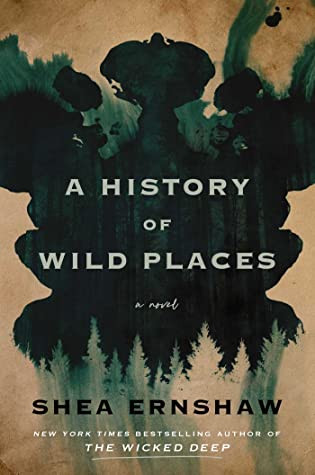 Thanks to Partners NetGalley and Atria Books for the digital ARC of Shea Ernshaw’s A History of Wild Places in exchange for an honest review. The book will be published on December 7, 2021. I’m a fan of Shea Ernshaw’s YA books The Wicked Deep and Winterwood, so I’m not surprised that I loved A History of Wild Places, her first book for adults, as much as I did. It demonstrates the same talents for establishing and sustaining a unique, unsettling atmosphere and for building a compelling, complex world as those first two books. Ernshaw also has an ability to create complex, intriguing characters to populate her novels. In A History of Wild Places, we start with a book within the book: Foxes and Museums, book one in the Eloise and the Foxtail series, a super-dark fairytale for children. The book’s author, Maggie St. James, has been missing for five years, and Travis Wren—the protagonist of the second layer of the novel—has been hired by her parents to find her. He has an ability to touch objects and then see their memories which has made him valuable to those searching for lost loved ones, but personal tragedy has made him back away from humanity. It’s only as a favor for a distant friend and a desperation for work that has brought him to this search. As he follows her last-known path, he enters an isolated town in search of a mysterious community called Pastoral. Then, the narrative shifts again and relocates into Pastoral itself, where we follow three characters: Theo, a man who is increasingly curious about what lies outside of Pastoral; Calla, who fears the potential consequences of her husband’s questions; and Calla’s sister Bee, a blind woman with abilities that make her valuable to Pastoral’s leader. The shifting nature of truth, of what we think we understand and what lies beneath, mirrors the characters’ own search for identity and truth. It’s a gorgeous novel full of narratives made unreliable because of every character’s limited knowledge. As those disparate pieces come together, I found myself shifting them around, trying to make sense of the way the layers of the story connected. A History of Wild Places is a brilliantly immersive novel, one that I couldn’t stop reading. Ernshaw is definitely an auto-read author for me. 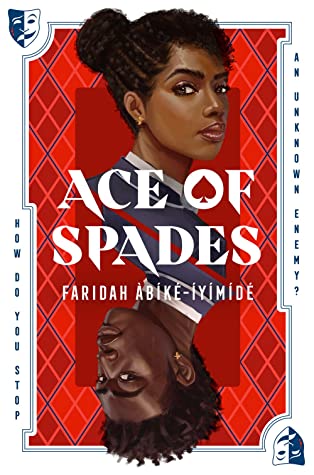 Thanks to Partners NetGalley and Macmillan for the digital ARC of Faridah Àbíké-Íyímídé’s Ace of Spades in exchange for an honest review. The book will be released on Tuesday, June 1. I wasn’t very far in Faridah Àbíké-Íyímídé’s Ace of Spades when I started to realize that something really strange was happening with the characters. Some of the pieces of this YA novel are familiar from other books about the power of privilege and the difficulty of navigating systems of power as an outsider, but other parts are wholly original. There’s a predominantly white private academy with a few key student honors for Senior Prefects. The narrative focuses on two students, the only Black students in their grade: Chiamaka Adebayo who has been forging a path to the top of her class, of the social scene, of every extracurricular, since she was a freshman; and Devon Richards who tries to stay as invisible as possible, banking on his talent as a musician to pave his way (and his family’s way) out of poverty. On the first day of their senior year, they attend the opening assembly with a new headmaster and find out the prefects. It’s no surprise that Chiamaka is named Head Prefect, but everyone is shocked when Devon receives one of the other Prefect spots. This is not part of the plan, and this initial contrast between Chiamaka’s confident acceptance of what she sees herself as being owed and Devon’s complete shock was immediately compelling. Chiamaka is surrounded by people, but they’re not really friends (at least mostly). Instead, she has a series of transactional relationships that help her to maintain her popularity—maybe her “popularity”—while doing the same for them. The one exception is Jamie, her absolute best friend . . . and the guy she’s had a crush on forever. Finally, she thinks it’s time for them to define their relationship differently. Devon, conversely, is a loner. He has one person, Jack, who has been his friend for a long time, but lately, that friendship seems to be based more in memory than in reality. Àbíké-Íyímídé develops these characters effectively as she shows how they are both so alone but in different ways. Clearly, Chiamaka and Devon are complete opposites. The only things they have in common are their race AND that they each have secrets that could ruin all of their plans. So when someone who goes by the moniker Ace of Spades starts sharing those secrets with the entire student body, Chiamaka and Devon are drawn to each other for support and to work together to solve the mystery. I thoroughly enjoyed this book, which earns its comps to Get Out. It took me a few chapters to be pulled in completely, but once the plot started unfurling, I couldn’t wait to pick up this book, which was just wild. Àbíké-Íyímídé writes the book in chapters that alternate between Chiamaka’s and Devon’s points of view, which amped up the suspense as I tried to piece together the real story behind the sabotage. The author addresses issues of race, sexuality, privilege, and class, all while developing two complex characters and a thrilling plot. 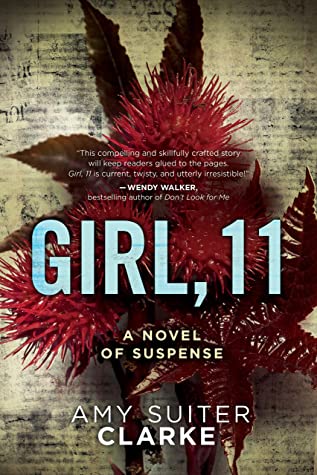 Thanks to Partners Houghton Mifflin Harcourt and NetGalley for the digital ARC of Amy Suiter Clarke’s Girl, 11 in exchange for an honest review. The book is out today! Elle Castillo is a true crime podcaster who investigates cold cases. A former social worker with her own history as a victim of crime, Elle chooses a different serial killer for each season of her podcast, determined both to rejuvenate the investigation and to focus attention on the victims. Now, in season five, Elle decides to focus on The Countdown Killer. TCK’s first known victim was 20 years old. Three days after kidnapping her, he kidnapped a young woman who was 19. The body of the first victim was revealed seven days after she was taken. TCK is methodical, obsessed with numbers, and incredibly careful, leaving only very particular details for the police to investigate. He continues with his countdown, kidnapping and killing girls in order until one of his victims escapes. This is the 11-year-old girl, and though she recovers, she’s unable to provide any clues about TCK’s identity. His countdown ends, and most people think he’s dead. But Elle doesn’t agree. Elle is in the midst of the season when she gets a tip from someone who thinks he knows who TCK might be. When she arrives at the caller’s apartment, she finds him dead, and there’s some indication that it might be his message to her that caused his death. So, that’s the premise of the book, and I found that to be intriguing enough. What I really enjoyed about this one, though, is not this bare outline of the plot. Elle is a great protagonist: we know that her work as a podcaster and investigator is based on her desire to help people in ways she couldn’t always manage as a social worker. She also consults with the police, offering her investigative skills to help them uncover clues. She has a strong web of found family and friends—her husband Martín is a forensic investigator (he sometimes appears on the podcast); she also has a close friend Sash, and though Elle and Martín can’t have children, Sash’s daughter Natalie is like a part of their family. The sense of community support, of the ways that Elle has reached out—though she’s not close with her biological family—to make connections is lovely. The style here is also great: the first part is told in alternating chapters, with transcripts of podcast episodes providing the background of TCK through interviews and Elle’s narration, and then the other chapters focusing on the current course of Elle’s investigation. Though there were some twists and turns of the plot that I predicted, there were also some great surprises. Amy Suiter Clarke’s Girl, 11 is a strong, compelling, and thoughtful thriller that I’d recommend to readers looking for a balance of plot and character. |
AuthorI'm Jen Moyers, co-host of the Unabridged Podcast and an English teacher. Archives
July 2021
Categories
All
|
Proudly powered by Weebly
 RSS Feed
RSS Feed